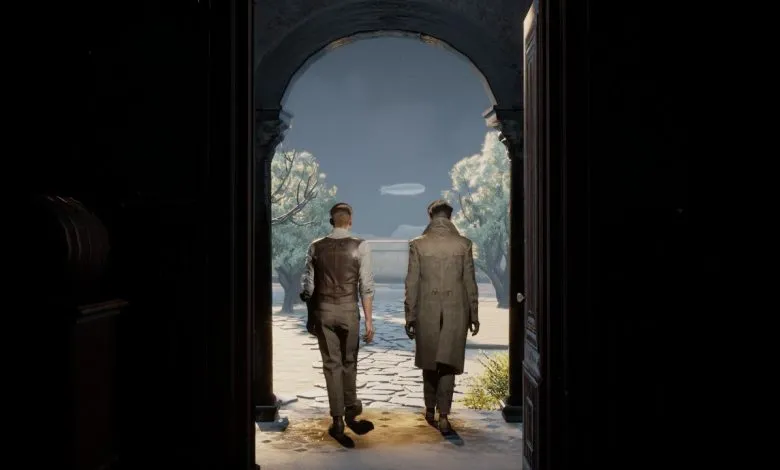
SHERLOCK HOLMES CHAPTER ONE
Our thorough and highly detailed reviews of the immediate past installments in Frogwares' Sherlock Holmes series, The Testament of Sherlock Holmes, Crimes and Punishments and The Devil's Daughter chronicles the progressive transition of the series' essense from that of a more "traditional" Adventure game to something more akin to an Action-Adventure Detective game. The Devil's Daughter also noted Sherlock's visual "rejuvenation", who now appeared much younger than what we were used to. The next entry in the series, Sherlock Holmes Chapter One (note: the name does NOT imply an episodic release, but a prequel), continues in the exact same modernist gameplay pattern, while implementing the open-world features seen in last year's The Sinking City from the same company. But the protagonist's youth also goes a step further (or further back, depending on one's perspective). As the title of the game itself implies, the Sherlock we control in Chapter One isn't the universally known and accomplished detective we're used to, but a youthful 20-21 year old who decides in 1880 to return to the place where he spent part of his childhood.

That place is Cordona, a fictional Mediterranean island located in an undefined location somewhere between Italy and (then Ottoman-occupied) Libya, whose main features immediately bring Malta to mind but... not quite. Specifically, Cordona is under British administration but has a strong element of Italian culture and a rich history (and corresponding ancient material remains) dating back to Greco-Roman antiquity and the Knights Hospitaller. The "not quite" part refers to the fact that the majority of the island's native inhabitants appear to be of Ottoman/Muslim culture, which creates a stark contrast (occasionally evolving into direct conflict) with the cosmopolitan Victorian essence that a Sherlock Holmes story is bound to radiate.
It is to this island that young Sherlock chooses to return in 1880, to visit his long-abandoned family mansion and to investigate some "gaps" in the story of his mother's death. Inevitably, of course, in the course of his investigations he will end up becoming involved with the wider affairs of the island, using his particular talents in the service of the locals and, of course, the Crown.
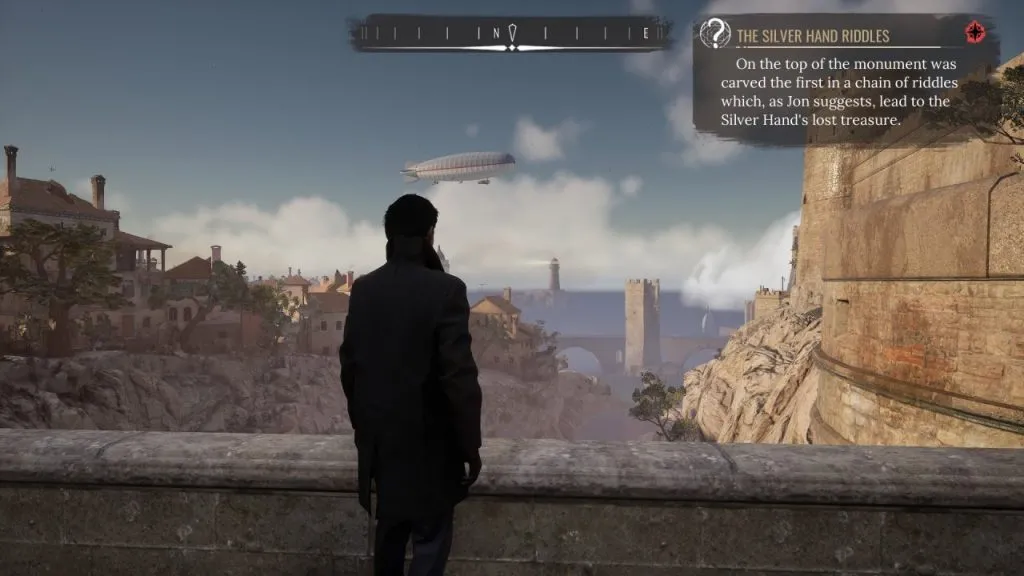
As part of the aforementioned open-world nature of Chapter One, we can tour Cordona's eponymous capital in a single open-world environment. The city is divided into districts, each with a completely unique atmosphere, architecture and layout, and with inhabitants of different racial and class backgrounds. The excellent visual rendering of Cordona and its disparate districts is certainly one of Chapter One's great assets: from the wide, cobbled avenues and luxurious mansions of the wealthy areas, to the narrow alleys of the Old City and the wooden shacks of the miners' quarter, each part of the city has different emotions to offer, both aesthetically and in terms of the available Investigations (more on these later).
While on the subject of the open world, it's worth mentioning that Sherlock Holmes Chapter One attempts to fix (and largely succeeds in doing so) almost all the flaws that one could point out in the corresponding area of The Sinking City, with the main flaw being the lack of things to do in that open world. Now there's plenty of incentives offered for browsing and exploring Cordona, from activities like treasure hunts, photographing landscapes and gathering collectibles, to new Investigations that pop up by... eavesdropping on the conversations of random NPCs!
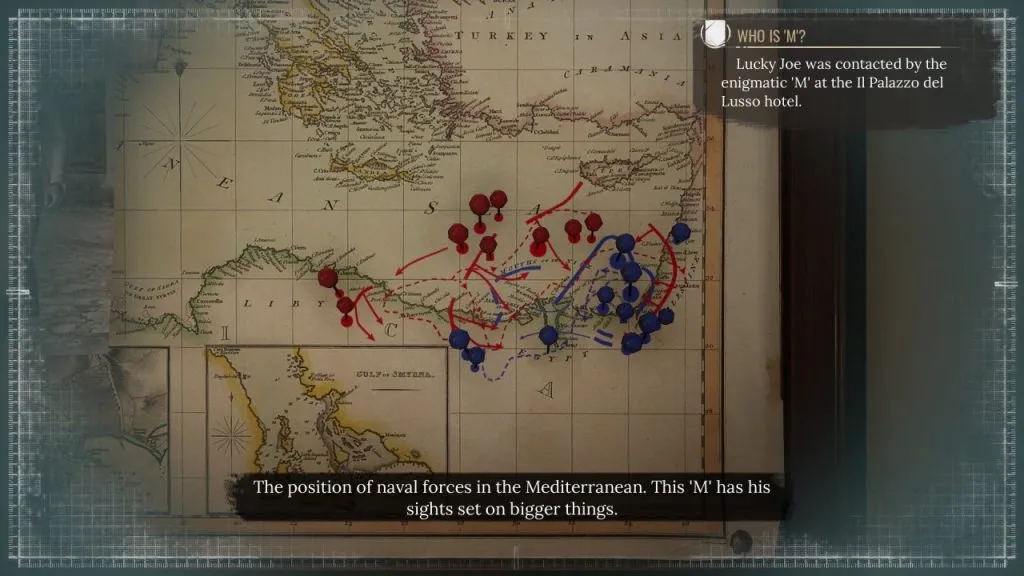
Another innovation of the game, which is also connected to the open world, is the Disguises system. Sherlock as a character is fond of disguises, and thus can collect a plethora of different costumes and other disguise materials during his adventures in Cordona (either by completing Investigations, or from the respective merchants on the map). These, apart from the obvious change in the protagonist's physical appearance, also serve gameplay purposes. Cordona's NPCs are divided according to their class/professional background into six different reputation groups, and each of them is more positively disposed towards people who adopt a particular disguise (and thus will more willingly give information to them). Apart from that, adopting for example the dress code used by a gang will allow us to enter their hideout easily and bloodlessly.
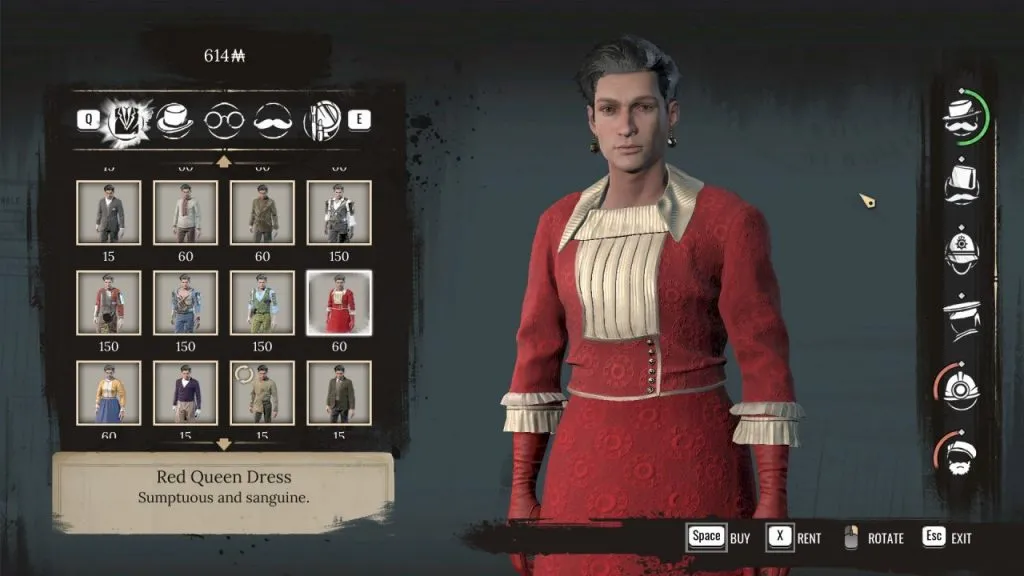
For those instances where an encounter is not so bloodless, Chapter One also implements a fairly limited combat system. Combat takes place exclusively in the form of instances (meaning we can't just draw a pistol in the open world and shoot everyone), in which we face waves of enemies in small "arenas". During these battles we can aim directly and kill opponents, but everyone in the world suggests Sherlock take a... less violent approach, which involves targeting specific weakpoints of opponents and subsequently stunning them via a (thankfully short) Quick-Time Event.
The above may sound a bit strange and possibly not very tempting, but it should also be mentioned that, as part of the extended customization options for the game's difficulty, battles can be completely disabled from the respective difficulty menu, which makes them optional for anyone who doesn't really want to fight. However, Chapter One also offers material for those who want to delve deeper into the combat gameplay, as they can visit one of the bandit dens scattered across the map, where they fight villains for money that can be spent at Cordona's merchants to buy disguises or furniture for Sherlock's mansion.
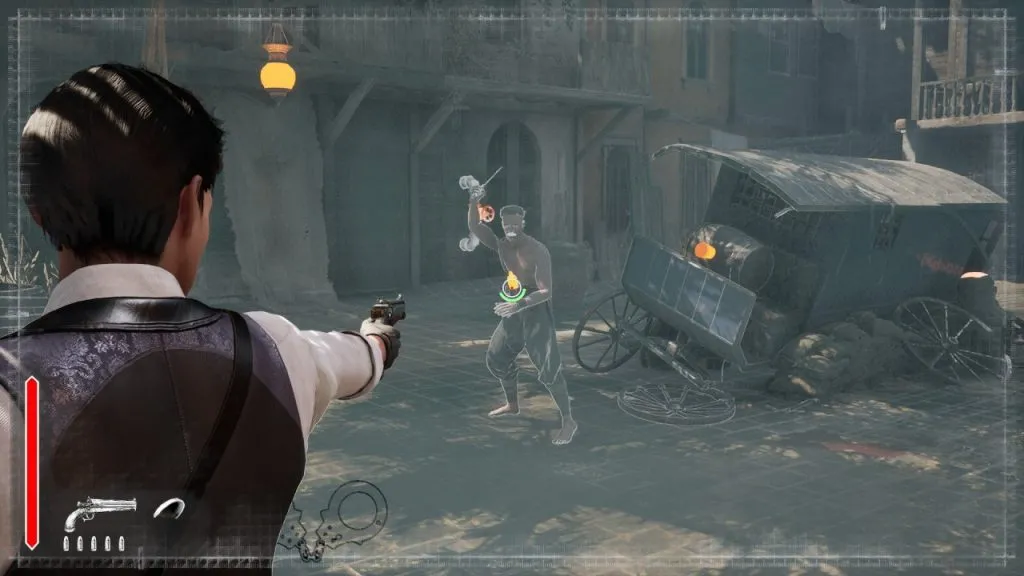
Naturally, the game's core still consists of Investigations. Those who have played or read reviews for the 2 previous Sherlock Holmes games as well as The Sinking City will know exactly what to expect in Chapter One: talking to suspects, collecting evidence and processing it in Sherlock's Journal , visiting Cordona's Archives, reconstructing the events at the crime scenes, forming Deductions at Sherlock's Mind Palace and, finally, accusing whomever we think is guilty of the crime. These accusations are once again quite "open-ended", allowing us in most cases to choose between 2 or more guilty parties, but also to choose whether to arrest the guilty party in question or let them go, depending on the moral implications of each crime and the larger picture formed by the crimes taking place in Cordona.
Having completed all the Main and Side Investigations I managed to locate on the map (about 30 in number, not counting other open-world activities like treasure hunts), I must admit I was impressed by how well-written they were for the most part. Most of the crimes are genuinely imaginative, some to the point of being even shocking, with the investigation into each of them unfolding brilliantly and occasionally leading to quite unexpected revelations. Based on the "road map" of the game, extra Investigations are expected to be added in the future, and I am geuninely looking forward to that moment with excitement.
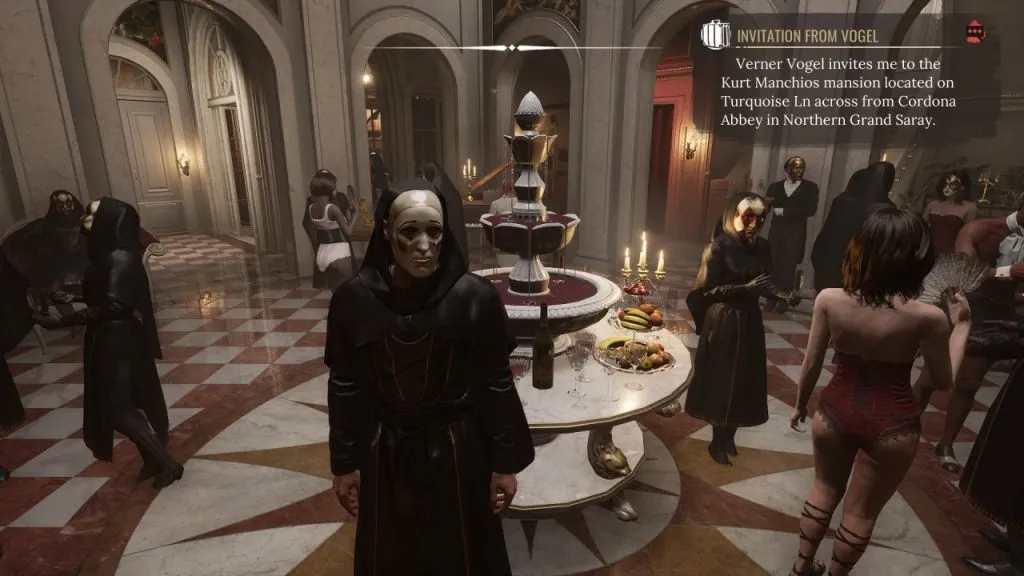
Apart from the excellent writing in the game's Investigations and dialogues as well as the rather light-hearted tone that may characterize the wisecracks that the arrogant young Sherlock throws at everyone, and beyond its concept as "just" a detective story in the Sherlock Holmes universe, the narrative in Chapter One has another, rather darker aspect. The visit to the mansion where Sherlock spent his childhood, the progressive revelations about his mother's death and, most importantly, how the protagonist deals with them up until the finale, give the title a deeply psychological extension, bordering on a dissertation on the management of loss and grief. I won't go into further detail to avoid spoilers - this story deserves to be unfolded by the player without outside influences - but it would be an omission not to at least mention the above.
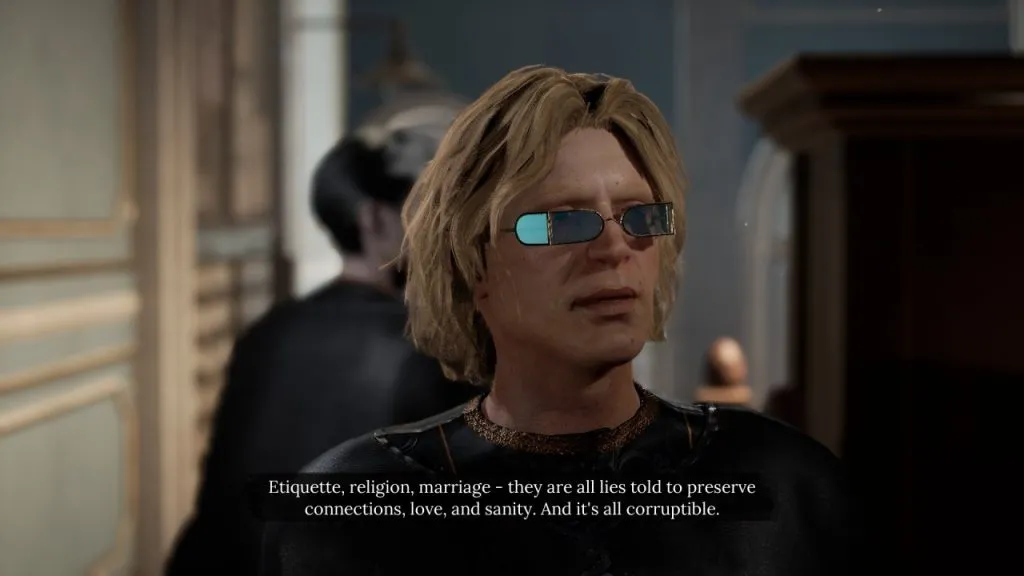
I appreciate that there are two "schools of thought" as to the direction the Sherlock Holmes series has taken since Crimes and Punishments. The way anyone chooses to approach Chapter One inevitably ends up determining whatever negatives they might point out about it.
A fan of more "traditional" adventure games will inevitably focus on the more innovative elements that might seem foreign to the genre, some of which are already known from the 2 previous games of the series: the young protagonist, the Action elements such as battles and Quick-Time Events, the Open World and the complete absence of Inventory-based puzzles. Perhaps the only elements that could be perceived as similar to the philosophy of the older games are searching the Archives, interpreting clues to pinpoint locations on the map, and the existence a chemical analysis "puzzle" that we will occasionally be asked to solve when interfacing with clues we have collected, which has an old-school adventuristic logic behind it.

If one doesn't have the above concerns and/or is looking for more or less an experience similar to Crimes and Punishments/Devil's Daughter, they will probably be more receptive to what Chapter One has to offer. In that regard, the flaws I could objectively point out are few and far between. For example, an element I remember being concerned about because it somewhat spoiled the immersion is the fact that the NPCs roaming the world seem to be random-generated, as if their appearance and personality are items pulled from a generic pool of available options. So we'll get, for example, a person on the street who is clearly of African descent, wearing a Victorian suit, speaking with a heavy English accent, and whose origin and occupation appears as "Swedish Lawyer". Something that is obviously not remotely believable as likely to exist by 1880s standards, and ends up taking even 1% of the "plausibility" out of an otherwise finely structured world. Aside from the above, I wouldn't say no to having a more in-depth tutorial on the game's mechanics, as it's quite chaotic to get to grips with them initially. But in the end, most of the negatives I can add are rather minor.
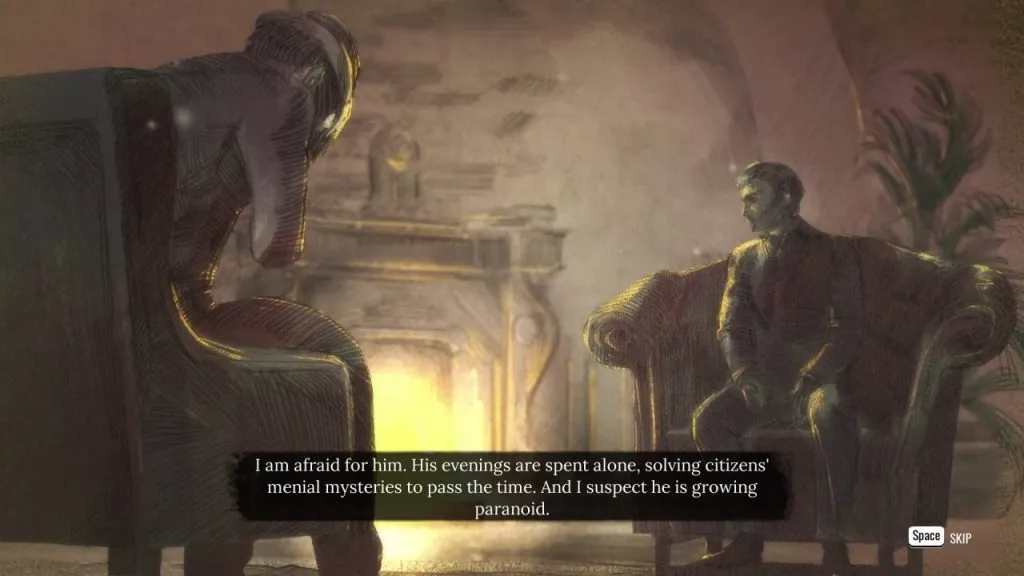
I suppose I am now closer to the second of the above categories, and for that reason I can perhaps appreciate Chapter One more for what it offers, rather than regret what it is not. And what it does offer is no small feat: well-written dialogue and central plot, clever cases to be investigated, equally clever humorous touches balanced by some genuinely dark elements, extensive customization of the difficulty to prevent any notion of hand-holding, always coupled with the gorgeous Cordona and touches of familiar Sherlock Lore. And technically flawless, too, as I haven't encountered the slightest bug in the 40 or so hours I've spent on it.
In conclusion, I may not be the most "hardcore purist" of the adventure game genre, and therefore I can "forgive" some features that may be a real red flag for some people. But I am at least able to appreciate a good game whenever one comes my way. And the truth is that, regardless of the genre one chooses to place it in, Sherlock Holmes Chapter One is a really good, perhaps even excellent game.
RATING - 90%
90%
An extremely well-made Sherlock game, regardless of the genre one chooses to place it in.















First! :Ρ
Κράταγα σχετικά μικρό καλάθι αλλά φαίνεται να έχει πράγματα να δώσει. Wishlisted.
[URL unfurl=”true”]https://www.unrealengine.com/en-US/developer-interviews/frogwares-explains-how-the-sinking-city-helped-shape-sherlock-holmes-chapter-one[/URL]
Ωραίο Review, thank you
To Crimes & Punishment μου άρεσε πολύ. Το The Devil’s Daughter όχι και τόσο, οι υποθέσεις του ήταν για μένα κατώτερες του C&P και κάποια καινούρια στοιχεία στο gameplay ελαφρώς παράτερα. Το Chapter One φαίνεται να πατάει και να εξελίσσει τη συνταγή. Πέρα από την ηλικία του Sherlock μου κάνει εντύπωση η αντικατάσταση του Watson από κάποιον Jon Doe. Δεν είμαι γνώστρια του Sherlock lore, ούτε έχω διαβάσει κάποιο βιβλίο οπότε δεν με πειράζει ιδιαίτερα. Όμως όπως χάνει την adventure ταυτότητα του, έτσι χάνει και το Sherlock χαρακτήρα του από game σε game. Κάποια στιγμή πάντως θα το τιμήσω.
Βασικά από τις πρώτες στιγμές του παιχνιδιού μαθαίνεις πως ο Jon είναι [ISPOILER]κυριολεκτικά ένας imaginary friend του Σέρλωκ.[/ISPOILER] Το τι και πως, και το πώς κολλάει με τον ίδιο τον Watson στη συνέχεια, επεξηγείται στην πορεία του κυρίως σεναρίου.
Σε ό,τι αφορά το lore, ακριβείς ημερομηνίες δεν δίνονται, αλλά το πιθανότερο είναι πως το A Study in Scarlet, πρώτη περιπέτεια του Sherlock και αυτή στην οποία γνωρίζονται με τον Watson, διαδραματίζεται 1880/1881, δηλαδή ελάχιστα μετά το Chapter One. Δεν κολλάει βέβαια ακριβώς με την ηλικία, μιας και κοινώς αποδεκτή ημερομηνία γέννησης για τον Sherlock είναι το 1854.
Έξοχη παρουσίαση, ως τεράστιος φαν των πρόσφατων παιχνιδιών Sherlock Holmes θα το τιμήσω σε Digital Deluxe (να μην πιούν ένα Λαγκαβούλιν τα παιδιά της Frogwares να τσουτσουρίσει το βατραχάκι τους; Τόσο κόπο κάμαν!) και όταν με το καλό το παίξω το 2024, θα μεταφέρω εντυπώσεις 😀
Υπό Κ.Σ θα το αγόραζα και θα το έπαιζα. Πλέον όχι (πού χρόνος για gaming πλέον…).
Αλλά είναι ευχάριστο να βλέπεις ότι η Frogwares ΜΑΛΛΟΝ κάτι κατάλαβε από τα λάθη της στο “The Devil’s Daughter”. Και λέω μάλλον, διότι, μέσα από το έξοχο review που διάβασα, κατάλαβα ότι εξακολουθούν να υπάρχουν στοιχεία που μπορούν -και πρέπει- να πάρουν πόδι στον επόμενo τίτλο…
-Βλέπω σχόλιο Μάνου.
-Μπαίνω περιμένοντας να διαβάσω πόσο non adventure είναι το παιχνίδι.
-…
-Half disappointed.
[QUOTE=”Adhan, post: 585801, member: 102612″]
-Βλέπω σχόλιο Μάνου.
-Μπαίνω περιμένοντας να διαβάσω πόσο non adventure είναι το παιχνίδι.
[/QUOTE]
Αυτό θα προϋπέθετε να έχω παίξει το παιχνίδι, κάτι που δε συμβαίνει και δεν πρόκειται να συμβεί. Οπότε οι προσδοκίες σου υπήρξαν, αν μη τι άλλο, αβάσιμες. Αν ήμουν σε θέση να εκφέρω τεκμηριωμένη άποψη για το παιχνίδι (διότι μόνο τέτοιες διατύπωνα πάντοτε), σε τόσο σύντομο διάστημα από την κυκλοφορία του, αυτομάτως θα σήμαινε ότι θα ήμουν σε θέση να το παρουσιάσω. Μπα…
[MEDIA=youtube]FWuPbtFsLIw[/MEDIA]